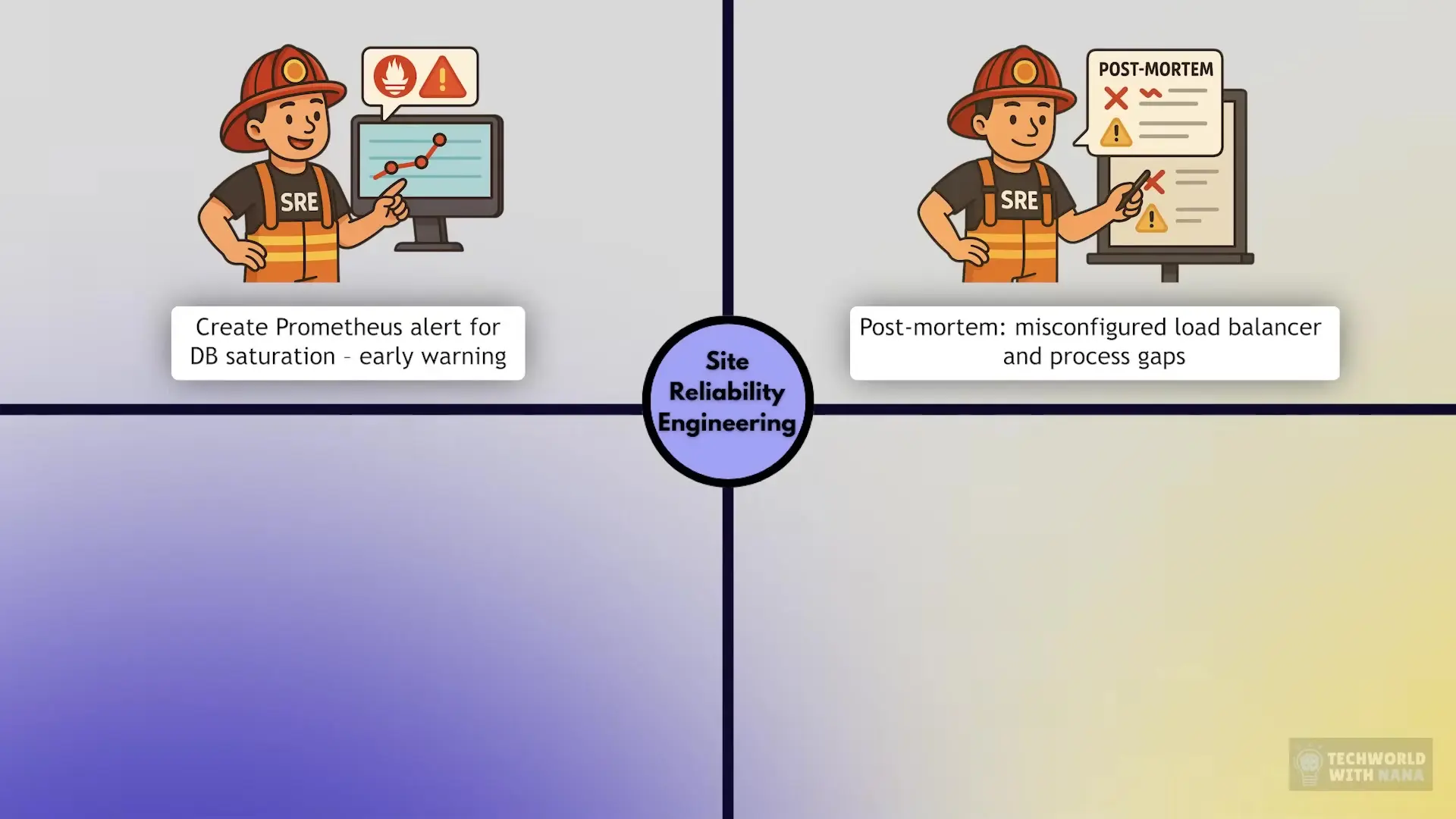
Many aspiring DevOps professionals face a moment of overwhelm when they realize that "DevOps" isn't just one clear-cut role. The landscape includes cloud engineers, SREs, platform engineers, DevOps engineers, and specialists in GitOps, DevSecOps, and MLOps—all requiring DevOps skills but with different focuses. This creates a natural question: which specific career path should you train for, and where does the DevOps journey actually lead?
This uncertainty creates real anxiety for many. You're investing significant time and money into learning these skills without a clear destination. It's difficult to stay motivated or make strategic decisions about what to learn next without understanding where you're heading professionally.
Understanding the specific branches that stem from your DevOps foundation allows you to align your learning with your natural strengths and interests. Someone who enjoys diving deep into security incidents will thrive in a completely different role than someone energized by building tools for other developers.
Path 1: DevOps Engineer - The Foundation Role
Let's start with the most direct path: becoming a DevOps Engineer. While DevOps began as a concept and cultural movement (not a job title), it quickly evolved into a distinct role as companies needed specialists to implement these practices alongside traditional software engineering or system administration work.
What DevOps Engineers Actually Do
As a DevOps engineer, you're the person who builds and maintains the pipeline that gets code from developers' laptops into production. You also ensure deployed applications are running properly and monitored for issues. You serve as the bridge between people who write code and the systems where it runs.
A typical week as a DevOps engineer might include:
- Fixing a broken Jenkins pipeline that's preventing the marketing team from updating their website
- Writing scripts that automatically create test environments when developers open pull requests
- Helping a database team set up automatic backups for production systems
- Debugging why containers are crashing in a Kubernetes cluster and implementing preventative fixes
Is This Role Right for You?
You'll thrive in this role if you're naturally curious about both sides of software delivery—not just how code is written but also how it runs in production. You should be comfortable jumping between different technical problems and explaining complex issues in simple terms to various teams.
While prior IT experience helps (either as a developer or in operations), many successful DevOps engineers started in one area and gradually learned the other side. The most important skill is being able to understand and communicate with both development and operations teams.
Salary Potential
The pay for this role is excellent, typically between $110,000-$170,000, with senior roles exceeding $180,000 at top companies.
Path 2: Cloud Engineer - Architect of the Digital Sky
Cloud engineers take DevOps automation skills and apply them to building and maintaining the entire cloud infrastructure that modern applications run on. This role represents a natural evolution once you've mastered core DevOps skills like infrastructure as code, CI/CD pipelines, containerization, and container orchestration.
As a cloud engineer, you're zooming out from specific application deployments to designing and managing entire cloud environments. Your DevOps automation experience becomes the foundation for orchestrating cloud ecosystems rather than just individual services.
Typical Cloud Engineer Responsibilities
A week in this role might include:
- Designing a multi-region AWS architecture for a new product launch that meets both performance and disaster recovery requirements
- Writing Terraform modules that standardize how your company deploys databases, complete with backup policies and monitoring
- Debugging mysterious spikes in cloud costs and implementing governance to prevent future waste
- Creating migration plans to move legacy applications from on-premises to cloud environments with minimal downtime
Ideal Traits for Cloud Engineers
You'll thrive in this role if you enjoy solving complex puzzles, have good spatial reasoning, and can balance technical requirements with business constraints. The ideal cloud engineer is both creative and methodical—someone who can imagine innovative solutions while implementing them with precision.

Salary Range
The salary range for cloud engineers is slightly lower than for DevOps engineers but still impressive. In the US, it typically starts at six figures and increases rapidly with seniority and expertise.
Path 3: Platform Engineer - The Tools Smith
Platform engineers are the tools smiths of the tech world—they build the digital workbenches that other developers use to create and ship products faster and more reliably. This role directly applies the force multiplier aspect of DevOps.
Once you understand how CI/CD pipelines, infrastructure automation, and containerization work from your DevOps expertise, platform engineering lets you package those workflows into user-friendly systems for the entire company. You're taking DevOps tools and principles and creating standardized, self-service versions that scale across an organization.
Day-to-Day Platform Engineering Work
A typical week might include:
- Meeting with software developers to understand their pain points, then creating a self-service portal where they can provision deployment environments without filing IT tickets
- Building a custom CLI tool that standardizes how developers deploy microservices, reducing deployment effort and errors by 60%
- Creating an internal app store of pre-approved services and templates with one-click deployment
- Working with security engineers to bake security best practices into application deployment workflows
- Designing documentation and conducting workshops to help developers adopt your new tooling
Skills and Personality Fit
You'll excel in this career if you have high empathy, strong communication skills, and enjoy creating systems that make complex processes simple for other teams. Platform engineers must understand both technical capabilities and human workflows, balancing what's technically possible with what's actually usable.
Think of it this way: DevOps engineers automate things and make them efficient for a project. Platform engineers take those tasks and standardize them for the whole organization, essentially automating the DevOps engineer's work itself.

Impressive Compensation
Given the value platform engineers bring to companies, US salaries typically range from $160,000 to $270,000 for experienced professionals. This role requires senior-level DevOps engineer skills, including the administration side of tools—not just usage.
Path 4: DevSecOps Engineer - The Security Guardian
DevSecOps engineers are security guardians who ensure that the systems built aren't vulnerable to attacks. They blend security expertise with automation to protect systems without slowing down development and deployment.
This path takes your DevOps automation, CI/CD pipeline knowledge, and infrastructure as code skills and adds a crucial security dimension. Once you understand how to automate deployments and infrastructure, DevSecOps involves injecting security checks and controls into those same workflows—essentially applying the "shift left" mentality specifically to security measures.
DevSecOps Engineer Responsibilities
Your week as a DevSecOps engineer might include:
- Implementing vulnerability scanning in CI/CD pipelines, then working with development teams to remediate critical vulnerabilities discovered in container images
- Creating GitOps workflows for security policies that automatically enforce rules like "no public S3 buckets allowed" or "all databases must be encrypted"
- Building a secrets rotation system that automatically updates API keys across Kubernetes environments every 30 days
- Working with compliance teams to implement continuous automated checks for industry-specific regulations and helping engineers fix discovered compliance issues
Is DevSecOps Right for You?
You'll thrive in this role if you enjoy investigative work, have an adversarial thinking style, and can balance security with practicality. The best DevSecOps engineers aren't just security-focused—they're also educators who help teams understand why certain practices matter.
Security automation is extremely valuable for companies, so these professionals often command high salaries. This is typically a senior DevOps engineer position, as DevSecOps implies you already have strong DevOps fundamentals plus specialized security knowledge.
Path 5: Site Reliability Engineer (SRE) - The Reliability Champion
Site Reliability Engineers focus on ensuring that large-scale systems remain available, scalable, and resilient. While DevOps engineers typically build the pipelines that deploy applications, SREs focus on what happens after deployment—making sure services stay operational and perform well.
This path takes your monitoring, alerting, and automation skills from DevOps and applies them specifically to production reliability. Your DevOps experience with infrastructure as code and configuration management becomes the foundation for implementing reliability engineering practices at scale.
Typical SRE Responsibilities
A week as an SRE might include:
- Conducting a post-mortem after a service outage, identifying both technical fixes and process improvements
- Creating and refining Service Level Objectives (SLOs) with product teams to define reliability targets
- Building automated remediation for common failure scenarios so systems can self-heal without human intervention
- Implementing chaos engineering experiments to proactively identify weaknesses in systems before they cause outages
- Optimizing database query performance that's causing latency spikes during peak traffic

Skills and Traits for Success
You'll excel as an SRE if you're analytical, detail-oriented, and calm under pressure. The best SREs are systems thinkers who can see how different components interact and potentially fail. They're also excellent at balancing reliability with feature development, using data to make trade-off decisions.
This role typically requires strong programming skills along with systems knowledge, as you'll often need to write tools and automation to solve reliability problems.
Path 6: MLOps Engineer - The AI Infrastructure Specialist
MLOps (Machine Learning Operations) engineers specialize in building the infrastructure and pipelines that allow data scientists to deploy machine learning models into production reliably and efficiently. This emerging field combines DevOps principles with the unique requirements of ML systems.
Your DevOps experience with CI/CD, infrastructure as code, and monitoring becomes the foundation for implementing similar practices for machine learning workflows, which have their own unique challenges around data versioning, model training, and inference serving.
MLOps Engineer Responsibilities
A typical week might include:
- Building a pipeline that automatically retrains ML models when new data becomes available
- Creating a model registry system that tracks model versions, their performance metrics, and deployment history
- Setting up monitoring for ML models in production to detect drift and degradation
- Optimizing GPU utilization in Kubernetes clusters for efficient model training
- Working with data scientists to containerize their models for consistent deployment across environments
Is MLOps Right for You?
You'll thrive in this role if you have interest in both infrastructure and data science/machine learning. The ideal MLOps engineer understands enough about ML to support data scientists effectively while having the DevOps expertise to build robust production systems.
This is a rapidly growing field with excellent compensation, as organizations increasingly need to operationalize their machine learning initiatives. The combination of DevOps skills with ML knowledge is rare and highly valued in the market.
Finding Your Ideal DevOps Career Path
When choosing your DevOps career path, consider these factors:
- Your natural interests and strengths: Do you prefer building tools for others (Platform Engineer), ensuring security (DevSecOps), or keeping systems reliable (SRE)?
- Your technical background: Coming from development might make certain paths more accessible initially than others
- Company size and industry: Larger organizations often have more specialized roles, while smaller companies may need versatile DevOps generalists
- Growth potential: Consider which fields are expanding in your region or industry
Remember that these paths aren't mutually exclusive—many professionals move between them throughout their careers or combine aspects of multiple specialties. The DevOps foundation provides flexibility to explore different directions as your interests and the industry evolve.
Conclusion: The DevOps Career Advantage
All six DevOps career paths share important characteristics: they're in high demand, offer excellent compensation, provide intellectually stimulating work, and have strong future growth potential. The key is finding which path aligns best with your natural abilities and interests.
By understanding these distinct career options, you can make strategic decisions about your learning journey and professional development. Whether you're drawn to the security focus of DevSecOps, the reliability emphasis of SRE work, or the developer experience improvements of platform engineering, your DevOps foundation provides a springboard to a rewarding and lucrative career.
Let's Watch!
6 DevOps Career Paths That Can Lead to Six-Figure Salaries
Ready to enhance your neural network?
Access our quantum knowledge cores and upgrade your programming abilities.
Initialize Training Sequence